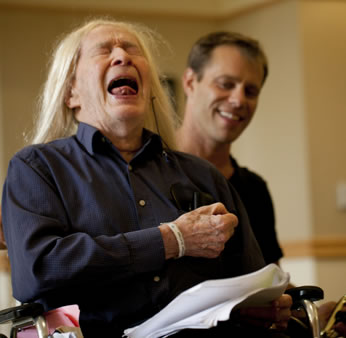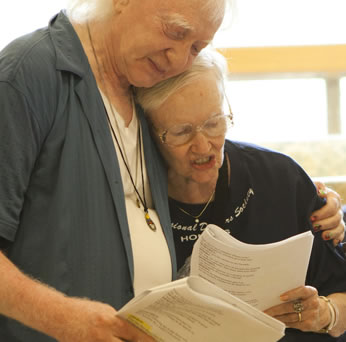Still Dreaming
Past the Wit of Man to Say
What Dream It Was
Philomath Films
Directed by Hank Rogerson and Jilann Spitzmiller. Featuring Ben Steinfeld, Noah Brody, and the residents and staff of the Lillian Booth Actors Home.

Bob Evans rehearses Flute playing Thisbe and stabbing herself in her heart as co-director Noah Brody watches in the Philomath Films documentary Still Dreaming about Lillian Booth Actors Home residents mounting a public production of A Midsummer Night's Dream. Photo by Genevieve Russell, Philomath Films.
People refer to the different worlds of William Shakespeare's A Midsummer Night's Dream: the world of Athens, the world of the woods, the world of the royal court and that of the royal fairies, the world of the rude mechanicals, the world of the play, the world of the play within the play. All of these worlds collide and create 24 hours (or three days—Shakespeare is a bit muddy with his timeframe) of confusion for the characters in the play.
In real life, as well, people live in colliding worlds of reality, illusion, and delusion, but they do so 24/7—though their own timeframes tend to be muddled, too. Theseus in A Midsummer Night's Dream says this is the state for "the lunatic, the lover, and the poet." It also is the state for people who age into some degree of dementia in which memories blur and the present becomes a slippery slope—people who end up living in long-term health-care centers and retirement communities.
That is the setting for Still Dreaming, the enchanting new documentary by Hank Rogerson and Jilann Spitzmiller that premiered in November at the DOC NYC film festival. Rogerson and Spitzmiller are the filmmakers who produced the landmark 2005 documentary Shakespeare Behind Bars about Kentucky's Luther Luckett Correctional Facility inmates producing The Tempest. On their second Shakespearean outing, the duo follows the residents of the Lillian Booth Actors Home in Englewood, N.J., as they mount a public performance of A Midsummer Night's Dream. Located 15 miles from mid-town New York, the Lillian Booth Actors Home is an assisted living and skilled nursing facility owned and operated by The Actors Fund. Its residents are retired actors, dancers, musicians, and other entertainment professionals or their spouses. Hired to direct the production, though, were two young theater impresarios, Ben Steinfeld and Noah Brody, co-founders of the Fiasco Theater Company.
Still Dreaming could have come off as an awe-shucks Hallmark-style weepy, but along with a cast of naturally engaging characters and some dazzling cinematography, the film goes much, much deeper by paralleling the hallucinatory world of A Midsummer Night's Dream with the cognitive issues the members of the cast encounter in their daily lives. "I'm getting to hear the play the way I never heard it before," Brody says. So do we, for even as they are playing their parts, these actors are living Dream's themes in their own private, physiological worlds. Yeah, you might need to tug on a tissue, but chances are that will be prompted by a particularly ascendant performance rather than any sense of tragedy. For, as with A Midsummer Night's Dream, while the characters may be struggling with the blurring of reality, illusion, and delusion, Still Dreaming plays as a comedy with a few key dramatic moments.
The film's title is a double entendre. "Still dreaming" in one sense refers to these former entertainers being given an opportunity to mount a professional stage version of a Shakespeare play for the public. In another sense, the title refers to the ever-present dream state that some of them live in. "How do we know if what we are experiencing is the real thing or the imagined thing?" Steinfeld poses in his analysis of Bottom in one of the rehearsals. "That's incredibly frightening." He would come to learn that some of these residents are far beyond that point.
The filmmakers visually play on this theme, too. Still Dreaming opens with a line from A Midsummer Night's Dream: "Are you sure that we are awake? It seems to me that yet we sleep, we dream." Cinematographer Shana Hagan employs various methods of distortion and visual allegory to further fertilize that verse planted into our own subconscious. At one point, we see the play's script through a reader magnifier. At another, we see a cloudy sky that suddenly warbles because it's really a reflection in a pond. As the project hits one perilous period, one by one, residents exit the rehearsal room and simply disappear from the picture; one of the directors does, too, indicating that age is not a prerequisite for losing your place in your world. Editing blurs the demarcation between the home's grounds and the surrounding community and sometimes misleads us into thinking that we are where we are not.
The directing duo of Brody and Steinfeld was an inspired choice to helm the play. They not only have a deep understanding of Shakespeare's texts, they have experience in bringing those texts to life in unique spaces and under formidable conditions. Under their direction, Fiasco produced the six-actors-and-a-trunk Cymbeline that became one of New York's biggest hits three years ago; the six-actors-and-six-doors Measure for Measure for New Victory Theater in New York last winter; and the six-actors-and-nothing-else Two Gentlemen of Verona last spring for the Folger Theater in Washington, D.C., a production that will be revived by Theatre for a New Audience in Brooklyn next spring. (The company's 10-actors-and-a-piano Into the Woods will be opening at New York's Roundabout Theatre this month.)
Having two directors also enables the filmmakers to limit voice-over narration and interviews. Most of the exposition comes from directors, cast, and the home's staff talking with each other. On their first day, the two directors walk past an ambulance waiting outside the home's entrance. "Oh good, we get to spend the next six weeks confronting our own mortality," one of them says. That offhand remark earns a laugh, but, really, they have no idea that, rather than facing mortality, they are stepping into an alternative reality: the world of the retirement center, where life is as long as that day and residents, especially those with highly involved physical or mental impairments, become jealously attached to their daily routines. For those with cognitive issues, this is the only day they know, and even the staff adapts to that psychological state, the very essence of a live-in-this-moment zen. "What does success mean for us?" Brody asks when he and Steinfeld first meet the cast, intending to create an ensemble spirit as much as a goal for the production. But for this group, success is having lunch in the dining room and, maybe beyond that, supper, too.
Of all the challenges Brody and Steinfeld have encountered in the theater, perhaps nothing compares with the dawning realization that their Helena, Gloria Albee, may seem perfectly lucid but actually lives in a shifting contextual existence. She drops out of the cast because she says she has to move to Arizona and needs to pack; the next day, she reports that she had just returned from Arizona after several months living there. "I don't know what's weirder," Steinfeld says: "Gloria telling me she's moving across the country tomorrow or finding out that she's not. I don't know what's harder to process." He jokes that he feels like a character in A Midsummer Night's Dream, uncertain what's real or a nightmare. Yet, the directors' primary concern is losing such a strong actor for the key part of Helena (Brody ends up playing her).
It's too easy to see these old people as, well, merely old people, turning age into their primary identity, so the filmmakers prominently display their storied pasts whenever they can. A few cast members, in fact, are seasoned Shakespeare vets. Aideen O'Kelly, cast as Quince, played Emilia in the 1981 American Shakespeare Theater production of Othello with James Earl Jones and Christopher Plummer, which moved to Broadway the following year. She is forced to withdraw from this production of Dream because of medical issues, and Mary Depaulo, who had never acted before, steps in and kills in the part, her sharp sense of humor and timing not only nearly stealing the play but the movie, too.
Harold Cherry is a veteran of the Shakespeare festivals circuit who is, nevertheless, getting to play Bottom for the first time, walking across the Lillian Booth grounds rehearsing his scenes with a donkey mask covering his face. Donning the long blond wig of Flute playing Thisbe is Bob Evans, new to Shakespeare but, with 14 original Broadway productions under his belt, up to any challenge. In the original production of Damn Yankees, choreographer Bob Fosse asked Evans if he could juggle. "I couldn't, but I said yes," he says, and we see a press clipping of him juggling while dancing. Also new to The Bard is John Gray, but he displays immediate insight into the challenges facing all actors as he tries to get his arms around his role as Lysander: "Every time I think I understand the character, Shakespeare screws me up," he tells Lynette Loose playing Hermia.
Loose is making her very first attempt at acting. "I want to do this so well that Ben and Noah will say, 'Good job.' That's my goal," she says. When we learn that she had a demanding father who insisted she marry a man she never loved, she seems perfectly cast. Theseus's threatening lines to her in the play's opening scene "Makes me want to cry," she tells the directors. "Are we allowed to do that?" "Of course," they reply. But one of their biggest issues in bringing the production to a successful public performance is working with Loose to get her past some debilitating insecurity issues.
She's not the only one with a high personal stake in the production. Dimo Condos, a former member of the Actors Studio and the co-founder of the Lillian Booth Shakespeare group, plays Theseus and Oberon. Referring to his journeyman acting days, he says, "I still hope that I can make something of myself that people will remember." Scouring the landscape, picking up rocks, pieces of wood, mushrooms, seed pods, and other natural objects with which he makes sculptures, Condos is a very Oberon in his relationship with nature, and it is out there in nature where he earnestly rehearses, worrying a couple of joggers passing by. He also proves to be quite a Theseus in rehearsal, alternating between diplomatic wisdom and tyrannical action. He helps coach some of the less-experienced players, but he loses patience with Loose, leading up to a major donnybrook with the two directors. It takes Depaulo to cut the tension when she comforts Loose by telling her, "Don't get yourself upset. It's a show we're putting on for nothing."

Dimo Condos (here playing Oberon) and Charlotte Fairchild (Puck) rehearse one of their scenes in the Philomath Films documentary Still Dreaming. The two are part of the cast of Lillian Booth Actors Home residents who produced a public performance of A Midsummer Night's Dream. Photo by Genevieve Russell, Philomath Films.
Condos, though, is also responsible for one of the film's most tantalizing scenes as he rehearses with Puck, played by Charlotte Fairchild and her ever-present personal care assistant, Mayleen Adams. Fairchild, a veteran singer and dancer who headlined some musicals on the Great White Way, has Alzheimer's. In the film she sometimes seems more fit to play Poor Tom in King Lear than Puck; even in her moments of apparent clarity, we can't be sure what dimension she's in. As they rehearse Oberon's instructions to Puck to fetch the magical flower, Condos talks so vividly of Cupid and the mermaid on a dolphin's back and the arrow striking the little western flower that Fairchild responds by singing snatches of song perfectly suited to Oberon's poetic lines. "Absolutely extraordinary, both of you," Steinfeld says. "Best Puck and Oberon I've ever seen, that's for sure." Each day, Fairchild's performance of Puck changes but each is always fascinating in its weird way. We find ourselves wondering what kind of Puck will show up for the actual performance, though most of us might not see Alzheimer's true cruelty coming.
Rogerson and Spitzmiller cast no judgment on any of the proceedings. They let the cameras roll as Steinfeld works through his conflicted feelings about Albee's mythical Arizona connections and as Brody shouts down Condos. They show us the mundane of retirement center living—or, rather, what might seem mundane to us but the fact that they are getting bottled water instead of tap water at lunch causes excited conversation among the residents. And in what may be their wisest decision of all—for it results in the film's high point—they leave in, unedited, a prolonged segment of Fairchild singing Rodgers and Hammerstein's "You'll Never Walk Alone" accompanied by pianist Joan Stein. It is not germane to the production of A Midsummer Night's Dream, except, perhaps, to give us further proof of Stein's skills (we've already seen the former Your Show of Shows pianist demonstrate her perfect pitch to the amazement of Brody and Steinfeld). But it is germane to life in an assisted living facility as we watch and hear Fairchild belting out the song with, even at 80-something years old, a set of pipes Jennifer Hudson would envy. As the song rises to its crescendo, Fairchild wavers just a bit but then nails the big finish, and the audience—some moved to tears—applauds. I'm referring to the audience in the theater, by the way; in the film itself, Fairchild and Stein merely smile in self-satisfaction in the silence of an otherwise empty room.
"It's great to be alive," Condos says, expressing a deep sense of personal triumph after the public performance of A Midsummer Night's Dream. "I never said that when I was out there struggling. But here I have felt it's great to be alive."
Eric Minton
December 5, 2014
Comment: e-mail editorial@shakespeareances.com
Start a discussion in the Bardroom



 Find additional Shakespeareances
Find additional Shakespeareances